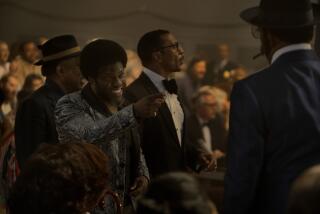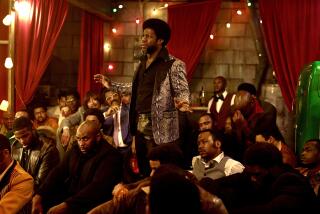Review: Review: Spike Lee at his peak, âBlacKkKlansmanâ uses the past to explain where we are today
Before Black Lives Matter and I Canât Breathe became hashtags â before hashtags even existed â Spike Lee was making movies exploring social justice issues and savaging societal racism. âBlacKkKlansmanâ is his latest, and it is one of his best.
Several things are remarkable about this film, which won the Grand Jury Prize at this yearâs Cannes Film Festival and stars a charismatic John David Washington in the mind-bending true story of an African American undercover policeman who became a card-carrying member of the Ku Klux Klan in 1978.
Perhaps most impressive is that the director, whoâs made more than 20 features and documentaries since his debut feature, 1986âs âSheâs Gotta Have It,â is not only still on fire but has found a story that allows him to be as excited and involved as he was when it all began.
And all that experience allows Lee to be as skilled a filmmaker as he is a committed polemicist, an artist as well as a provocateur who doesnât want us to get too comfortable even as we are entertained.
The key to it all is that Lee, his writing partner Kevin Willmott plus earlier writers Charlie Wachtel and David Rabinowitz have found a way to make this decades-old story unnervingly relevant to what is going on in todayâs world.
âThe biggest thing we wanted,â Lee said in an interview at Cannes, âwas to put stuff in the script, very strategically, so it would not be a period piece.â
Lee and company have accomplished this, and they have done it very much his way. Working with longtime editor Barry Alexander Brown, the director casually but fearlessly stirs things up, balancing brutal satiric comedy, unapologetic social commentary, convincing jeopardy, even appealing romance.
Also in the mix are random shots of classic blaxploitation movie posters and a gorgeous black-is-beautiful montage shot in 35-millimeter by cinematographer Chayse Irvin. As Lee told Film Comment magazine, âItâs a Spike Lee joint. Itâs not just one thing.â
At the heart of everything, obviously, is that strange true story. Though the filmâs elements of violent jeopardy and romance are not present in Ron Stallworthâs autobiographical book (âBlack Klansman: Race, Hate and the Undercover Investigation of a Lifetimeâ), the essential tale of a black man infiltrating the KKK is as boggling as it sounds.
Before the film gets to that, however, it sets the scene with two brief sequences: the celebrated âGone With the Windâ crane shot of wounded Southern soldiers ending with a glimpse of the Confederate flag, and Alec Baldwin playing way-bigoted Dr. Kennebrew Beauregard filming a racist PSA talking about mongrel nations and âour holy white Protestant values.â
This is as good a place as any to mention that âBlacKkKlansmanâsâ language is often as ugly and racist as you can imagine, maybe even worse than you can imagine. Having the worst of it spoken on the phone to Klan members by a black undercover policeman underlines the theme that racism is by definition as absurd and ridiculous as it is hateful.
When we meet Ron Stallworth â carefully adjusting his sizable Afro before entering the Colorado Springs, Colo., police station â the Klan is the furthest thing from his mind.
Rather, as played by Washington, who first acted for Lee as a child alongside father Denzel in âMalcolm X,â Stallworth is thinking of doing the right thing by being the first black officer on the Colorado Springs force.
Stallworth gets the job, but he chafes at rookie assignments such as the records room, where he has to stifle fury at white colleagues who refer to people of color as âtoads.â
Then fate intervenes and Stallworth gets a special assignment monitoring a local speech given by firebrand Kwame Ture (Corey Hawkins), the former Stokely Carmichael.
As a result he meets Flip Zimmerman (Adam Driver), the cop who will become his undercover partner, and Patrice Dumas (Laura Harrier), the righteous woman of his dreams.
Spike Lee hopes âBlacKkKlansmanâ is a wake-up call for the Trump era Âť
That speech, based on Tureâs actual talks, is one of the scriptâs key then/now parallels. Hearing Ture say, âWe are being shot down in the streets like dogs by white racist cops,â sounds frighteningly contemporary.
Bored by his job, Stallworth sees a notice advertising for the Klan in a local paper and on a whim calls the number (in real life, he wrote a note). Heâs shocked when local Klan leader Walter Breachway (Ryan Eggold) answers the phone.
Because, as he tells the chief, he can speak the Kingâs English on demand, and because racist tirades come easily to him, Stallworth so impresses the Klan honcho that a face-to-face meeting prior to membership is suggested.
Obviously, Stallworth canât go himself, so the Jewish Zimmerman is assigned to pretend he is Stallworth and go in his place, which leads to confrontations with Breachwayâs nasty associate Felix (Finnish actor Jasper PääkkĂśnen), a virulent racist who suspects Flipâs ethnicity and is not happy about it.
As for Stallworth, his phone prowess leads him to a long-distance friendship with David Duke (Topher Grace), the Grand Wizard of the Klan himself, which in turn leads to all kinds of complications when Duke makes a visit to Colorado Springs.
While âBlacKkKlansmanâsâ script periodically links today with back in the day, nothing prepares us for the impact of the filmâs final section, which uses news video to detail the chaos and death that took place in Charlottesville, Va., almost exactly a year before the filmâs release date.
Especially shocking in the context of what weâve seen is video of the death of Heather Heyer, killed when a car rammed into counter-protesters at a âUnite the Rightâ rally, and the presence of the real David Duke talking insistently about âtaking America back.â This battle is not over, Lee is telling us, not by a long shot.
In fact, the last thing viewers of âBlacKkKlansmanâ see, as audiences of Leeâs films have always seen, is the motto of his 40 Acres and a Mule production company: By Any Means Necessary. Though familiar, those words have never seemed so relevant, so to the point.
-------------------
âBlacKkKlansmanâ
Rating: R, for language throughout, including racial epithets, and for disturbing/violent material and some sexual references
Running time: 2 hours, 14 minutes
Playing: Opens Aug. 10 in general release
Twitter: @KennethTuran
More to Read
Only good movies
Get the Indie Focus newsletter, Mark Olsen's weekly guide to the world of cinema.
You may occasionally receive promotional content from the Los Angeles Times.











